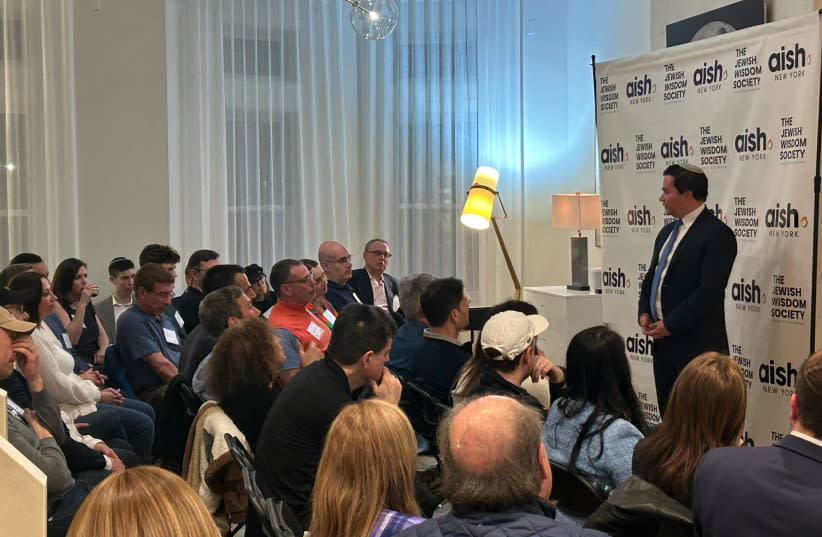MK Illouz US trip seeks Diaspora unity, House hearing on PA terror ties
Likud Knesset Member Dan Illouz visited the United States of America from April 4 until last Tuesday, with the goal of not only showing support for Jewish communities and students on campuses, but also to propose a US Congressional hearing on the Palestinian Authority’s connections to terrorism and the dangers of installing them in Gaza instead of Hamas.
In a conversation with The Jerusalem Post, Illouz explained that leaders needed to know the facts about the PA before pressuring Israel to take actions that would perpetuate the conflict. Ceding control of the Gaza Strip to the PA would have the “optics of solving conflict because they’re seen as more moderate, but is actually not a step in deradicalization, but another step in radicalization.”
Illouz said that exposure of the PA’s pay-for-slay program, education promoting terrorism, and other other incentives that encourage terrorist behaviour was necessary. Giving the Palestinian body more power would only cause problems in the future “as long as they teach hate.”
The American politicians that Illouz spoke to were reportedly open to a hearing modeled on the January House hearing on the United Nations Relief and Works Agency for Palestine Refugees in the Near East (UNRWA).
During his visit to the US capitol, Illouz said that he was touched by the support expressed by his American counterparts, who displayed Israeli flags or posters of hostages in their officers, showing how “deep our alliance and shared values extend.”

When Illouz visited The University of Maryland, University of Pennsylvania, and Columbia University, he hoped to dispel myths about the conflict by emphasizing these shared values.
Israel already making efforts to provide aid, limit civilian casualties
In his speeches, he explained that calls for Israel to limit civilian casualties and deliver more aid were not needed, because the Jewish state was already doing as much as a matter of national policy and military ethos.
As with the US, “Israel does everything it can to limit civilian casualties,” said Illouz.
Advocating on behalf of the Hamas hostages was another message that the MK attempted to convey. Adapting a rhetorical device used by the hostages’ families, Illouz began his speeches by counting the days, one by one, that they had been in terrorist captivity.
Illouz was met with some resistance on campus. UMD Students for Justice in Palestine organized protests outside the venue, claiming in promotional content that he was a “genocidal politician.” At UPenn, he was called a “war criminal.” Some UMD activists stood up and left his lecture while raising hands stained with red paint to demonstrate that Illouz had blood on his hands. He said that he ignored them and continued speaking.
“To be fair, they didn’t bother my lecture too much,” said Illouz.
On the trip organized by Hasbara Fellowships, Illouz said that it was important to show solidarity with the students defending Israel on campus. He said Israelis and Jews appreciated the time, work, and the bullying they endured since the October 7 Massacre.
Illouz also faced some opposition when he visited Jewish communities in Miami, DC, Philadelphia and New York. Anti-Israel activists had announced on social media that they would protest a talk, but a counter-protest was organized. Illouz said the counter-protest was less about him, and more about the important ability to be able to have elected Israeli officials speak. In the end, the anti-Israel activists didn’t show. What was also made apparent from such incidents and the coordination with the police required throughout the trip, was how much security work was needed.
“It’s kind of sad how much security is needed to speak on campus and at Jewish communities,” said Illouz. “The need for security shows that the situation in the US has changed.”
Many Diaspora Jews expressed to him how they felt less comfortable than they did in the past. He said that US authorities were trying to address the issue, but even so American Jews felt less protected. He said that he felt Aliyah should be done out of love for Israel, and that it was not an answer to rising hate. Israel needed to find a way to support Diaspora Jews.
“In the past, Diaspora Jewry has shown lots of support for Israel, now Israel needs to be there for Diaspora Jewry,” said Illouz.
He said that the concern and support that the Diaspora felt for Israel was immensely strong, and there was a lot of interest about the events in the Levant. Illouz said that he was touched by their support.
Though Israelis and Diaspora Jews may not agree on every issue, unity between the two had only grown since October 7, recognizing the “sense of common past and destiny.”





Comments are closed.